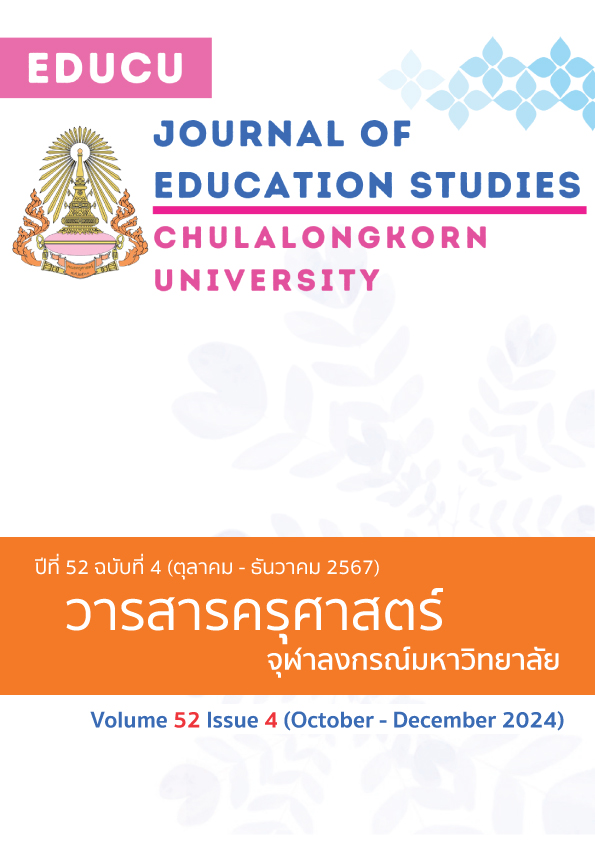Reform of Laboratory Courses Teaching in Higher Education to Enhance Sustainability in the Post COVID-19 Era
DOI:
https://doi.org/10.14456/educu.2024.56Keywords:
Higher Education, Instrumental Analysis, Post-COVID-19 Era, Sustainability, IntegrationAbstract
The COVID-19 pandemic has brought many difficulties and challenges to laboratory courses, but also promoted the development and prosperity of various teaching methods and made the position of laboratory instruction in higher education contemplated deeply. On the other hand, the monotonous and constant teaching materials and the formalized and theorized examination form have resulted in students' inertia and perfunctory attitude toward the experiment learning. Facing unpredictable futures and students' indifferent mentality, we urgently need to redesign the curriculum to enhance flexibility and resilience, meanwhile, ameliorate educational achievements. It is an important guiding principle of curriculum design to utilize diversified teaching methods and resources to continuously promote the multi-dimensional sustainable development of higher education under the new normal. In this work, an instrumental analysis experiment course was redesigned, and the students' views and suggestions on the new curriculum were inquired. Then the teaching effect was compared with that of the previous courses since the COVID-19 pandemic. The results indicate that the new curriculum design enables students to achieve better learning results in the three domains of learning. We anticipate that this teaching model will be improved continuously to be generalized to a more extensive educational field.
References
Akram, H., Yingxiu, Y., Aslam, S., & Umar, M. (2021). Analysis of synchronous and asynchronous approaches in students' online learning satisfaction during Covid-19 Pandemic. In 2021 IEEE International Conference on Educational Technology (ICET), 203-207.
Akramy, S. A. (2022). Shocks and aftershocks of the COVID-19 pandemic in Afghanistan higher education institutions. Cogent Arts Humanite, 9(1), 1-18. https://doi.org/10.1080/23311983.2022.2029802
Bauer, C. F. (2008). Attitude towards chemistry: A semantic differential instrument for assessing curriculum impacts. Journal of Chemical Education, 85(10), 1440-1445.
Brandriet, A. R., Ward, R. M., & Bretz, S. L. (2013). Modeling meaningful learning in chemistry using structural equation modeling. Chemistry Education Research and Practice, 14(4), 421-430.
Chan, J. Y. K., & Bauer, C. F. (2014). Identifying at-risk students in general chemistry via cluster analysis of affective characteristics. Journal of Chemical Education, 91(9), 1417-1425.
Chans, G. M., Bravo-Gutiérrez, M. E., Orona-Navar, A., & Sánchez-Rodríguez, E. P. (2022). Compilation of chemistry experiments for an online laboratory course: Student’s perception and learning outcomes in the context of COVID-19. Sustainability, 14(5), 1-26. https://doi.org/10.3390/su14052539
Chase, A., Pakhira, D., & Stains, M. (2013). Implementing process-oriented, guided-inquiry learning for the first time: Adaptations and short-term impacts on students' attitude and performance. Journal of Chemical Education, 90(4), 409-416.
Dukes Iii, A. D. (2020). Teaching an instrumental analysis laboratory course without instruments during the COVID-19 pandemic. Journal of Chemical Education, 97(9), 2967-2970.
Elliott, M. J., Stewart, K. K., & Lagowski, J. J. (2008). The role of the laboratory in chemistry instruction. Journal of Chemical Education, 85(1), 145-149.
Fabriz, S., Mendzheritskaya, J., & Stehle, S. (2021). Impact of synchronous and asynchronous settings of online teaching and learning in higher education on students' learning experience during COVID-19. Front Psychol, 12, 733554.
Galloway, K. R., Malakpa, Z., & Bretz, S. L. (2015). Investigating affective experiences in the undergraduate chemistry laboratory: Students’ perceptions of control and responsibility. Journal of Chemical Education, 93(2), 227-238.
Hensen, C., & Barbera, J. (2019). Assessing affective differences between a virtual general chemistry experiment and a similar hands-on experiment. Journal of Chemical Education, 96(10), 2097-2108.
Hoque, E. (2016). Three domains of learning: Cognitive, affective and psychomotor. The Journal of EFL Education and Research, 2(2), 45-52.
Murphy, E., Rodríguez-Manzanares, M. A., & Barbour, M. (2011). Asynchronous and synchronous online teaching: Perspectives of Canadian high school distance education teachers. British Journal of Educational Technology, 42(4), 583-591.
Nogueira, T., Magano, J., Fontão, E., Sousa, M., & Leite, Â. (2021). Engineering students’ industrial internship experience perception and satisfaction: Work experience scale validation. Educ Sci 2021, 11(671), 1-12. https://doi.org/10.3390/educsci11110671
Ramsden, P. (1991). A performance indicator of teaching quality in higher education: The Course Experience Questionnaire. Studies in Higher Education, 16(2), 129-150.
Reardon, R. F., Traverse, M. A., Feakes, D. A., Gibbs, K. A., & Rohde, R. E. (2010). Discovering the determinants of chemistry course perceptions in undergraduate students. Journal of Chemical Education, 87(6), 643-646.
Reese, S. A. (2014). Online learning environments in higher education: Connectivism vs. dissociation. Education Information Technologies, 20(3), 579-588.
Songkram, N., Chootongchai, S., Khlaisang, J., & Koraneekij, P. (2021). Education 3.0 system to enhance twenty-first century skills for higher education learners in Thailand. Interactive Learning Environments, 29(4), 566-82.
Xu, X. Y., & Lewis, J. E. (2011). Refinement of a chemistry attitude measure for college students. Journal of Chemical Education, 88(5), 561-568.
Downloads
Published
How to Cite
Issue
Section
License

This work is licensed under a Creative Commons Attribution-NonCommercial-NoDerivatives 4.0 International License.




